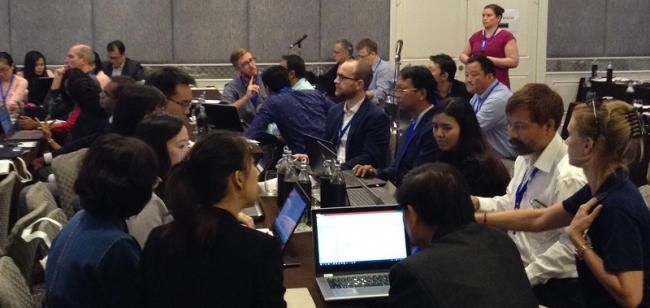Protecting 4 billion people against rabies through strengthened regional collaboration: The 1st ARACON meeting
In Asia, more than 4 billion people continue to be at risk of rabies. Of the estimated 59,000 human rabies deaths every year, the majority (59.6%) occur in Asia. As an expansion of GARC’s regional rabies networks, the 1st Asian Rabies Control Network (ARACON) Meeting was held in Bangkok, Thailand from 13-14th March 2018.
The global rabies conference in Geneva in December 2015 set the goal of eliminating canine-mediated human rabies by 2030 through the Global Framework for the Elimination of Dog-Mediated Human Rabies. Five pillars were identified to achieve rabies elimination: S-Socio-cultural; T-Technical; O-Organizational; P-Political; and R-Resources (STOP-R). Two of the key aspects highlighted were the importance of strengthening the intersectoral collaboration through the One Health approach (O-Organization) and creating avenues for participatory approach to exchange lessons learnt and experiences through regional collaboration (P-Political).
In 2015, the Pan-African Rabies Control Network (PARACON) was formed with GARC as the secretariat to unify all existing networks and harmonize the rabies control and elimination efforts of all countries in sub-Saharan Africa. The PARACON meetings have become a way for country representatives from the medical and animal health sector to gain hands-on experience in strategic planning, implementation and evaluation of national rabies programs using tools developed by GARC in collaboration with other international organizations (FAO, US CDC, WHO). These tools include the Stepwise Approach towards Rabies Elimination (SARE); the Rabies Epidemiological Bulletin (REB); and the GARC Education Platform (GEP). The meetings also introduced the Global Dog Rabies Elimination Pathway (GDREP) developed by US CDC to guide high-level policy makers in determining the funds and resources to plan and conduct mass dog vaccinations. To date, 38 countries have joined the PARACON.
Now a regional network has been established for Asia. Organized by GARC in collaboration with the US CDC, a total of 45 participants attended the first meeting. Participants included 27 country delegates from 13 Asian countries as well as representatives from international organizations (FAO, OIE, WHO, US CDC), animal welfare organizations (Humane Society International, Four Paws, Blue Paw Trust), and several pharmaceutical companies.
Similar to PARACON, the meeting was designed to be informal, interactive through “learning by doing” wherein delegates were given time to explore the different existing rabies elimination tools. The 1st ARACON meeting enabled the first SARE assessments for many Asian countries and became a venue to launch the Practical Workplan component of the SARE tool. This additional component builds the pending activities from the SARE assessment into a country specific work plan complete with a GANTT chart, objectives, outcomes, deliverables, and number of years to completion.
Other highlights of the meeting were the sharing of lessons learnt from different countries (Thailand, Philippines, Indonesia, Sri Lanka, and Malaysia) in the implementation of national rabies programs as well as a presentation from Vietnam on how a country aligns its rabies program based on a regional strategy, the ASEAN Rabies Elimination Strategy (ARES). FAO, OIE, WHO, provided examples on how they support rabies elimination efforts in the Asian region. An overview was also given regarding the United Against Rabies (UAR) initiative which is a global partnership between FAO, OIE, WHO and GARC to engage countries and other stakeholders from the national, regional and international level to generate high impact global response.
The meeting ended with an open forum between the country delegates and representatives from the international organizations. One of the key points during the discussion was the emphasis on regional cooperation and collaborative approach which are crucial due to the transboundary nature of rabies. The rabies incursion in Penang (2015) and Sarawak (2017) experienced by Malaysia, which used to be a rabies free country, is a case in point of this challenge and highlights the importance of regional coordination for strengthened early warning and rapid response between countries.
Contributed by Sarah Jayme, Asian Regional Coordinator for GARC. The meeting was made possible through the support of UBS Optimus Foundation, Four Paws, IDT Biologika, MSD Animal Health, and Sanofi Pasteur.

